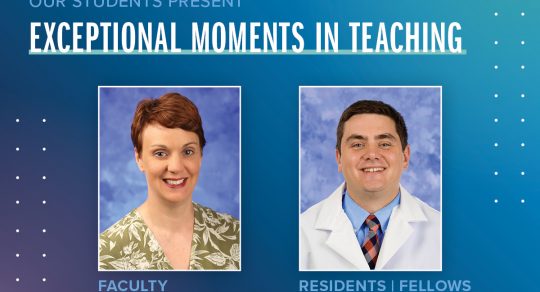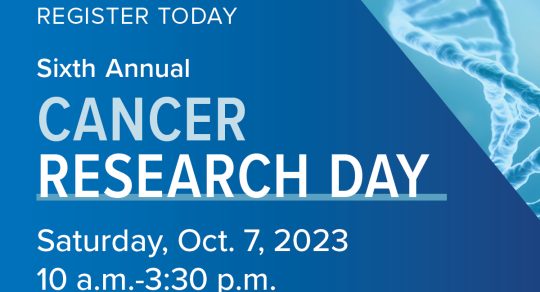Division
Hematology and Oncology
On This Page
The mission of the Division of Hematology and Oncology is to provide outstanding, comprehensive care to adults with hematologic and solid cancers; conduct transformative, knowledge-enhancing basic, translational, and clinical research to advance treatment; and educate the next generation of cancer researchers and clinicians.
Welcome to the Division of Hematology and Oncology, one of the largest academic subunits within the Department of Medicine. We are committed to cancer and related hematologic research, education and clinical care. We provide comprehensive, multidisciplinary and compassionate care for people with a variety of cancers and blood and bone marrow disorders. Our passion is to provide outstanding care while conducting transformative and leading-edge research to advance knowledge and personalized treatments in this field.
Our physicians, advanced practice providers and nurses work together to provide compassionate and world-class clinical care and state-of-the-art treatments to meet the needs of our patients and families. We provide expertise for all solid tumor types as well as hematologic malignancies, bone marrow and stem cell transplant, CAR-T and cellular therapies. We are deeply engaged in research on all fronts in basic and translational science, and clinical research. Our investigators conduct innovative National Institutes of Health-funded research and collaborate with researchers at Penn State University and Penn State College of Medicine to translate the latest discoveries to advances in therapeutics. In our clinical research, we take pride in being principal investigators and leaders in the Big Ten Cancer Research Consortium and other cooperative groups. We are equally passionate and proud of our dedication to teaching and training the next generation physicians, physician-scientists and advanced practitioners who will carry the torch for years to come.
Patrick C. Ma, MD, MSc
Interim Chief, Division of Hematology and Oncology
Professor of Medicine
Education in Hematology and Oncology
The Division of Hematology and Oncology is strongly committed to educating, training and mentoring the next generation of physicians, advanced practitioners, researchers and future leaders in the field. Faculty are involved in education at multiple levels and frequently receive awards for their dedication to teaching.
Educators in the division provide training for the next generation of specialists through the , a three-year, ACGME-accredited program that admits four fellows per year. A separate Hematology Track, a two-year, ACGME-accredited program that admits one fellow per year, is also available.
The Division of Hematology and Oncology hosts weekly CME accredited Grand Rounds that are attended by practitioners from many fields including radiation oncology, surgery, palliative care, nursing and pharmacy. The Grand Rounds bring the most up-to-date research and treatments in the field to the forefront, either with local or invited speakers, providing a place to interact with colleagues and discuss new ideas. The division also hosts an annual Cancer Research Symposium where fellows, residents, students and faculty showcase their research, monthly interdisciplinary conferences, monthly Schwartz Center rounds, and several Mini-Symposiums, Special Seminar Series and endowed annual lectures. In addition, each disease team hosts weekly tumor boards that significantly contribute to improved and coordinated patient care and also serve the division’s teaching and clinical research missions through identifying patient candidates for clinical trials.
Medical education consists of inpatient and outpatient clerkships and acting internships (hematology/oncology inpatient service, hematology consults, oncology consults and outpatient clinic rotations).
Research in Hematology and Oncology
As part of the Penn State Cancer Institute, the Division of Hematology and Oncology participates in the institute’s three core research programs: Next-Generation Therapies, Mechanisms of Carcinogenesis and Cancer Control.
The Next-Generation Therapies program promotes research in collaboration with University Park faculty investigators to discover and characterize novel anti-cancer agents and pathways and to conduct preclinical and clinical studies to provide more effective cancer therapies to patients.
Division faculty serve as principal investigators for clinical trials, many of which are based on ideas from internal faculty (investigator-initiated trials), as well as cooperative group trials and industry-sponsored trials. In addition, division faculty members are also involved in laboratory-based basic and translational cancer research with a focus on cancer biomarkers, novel therapeutics, immunotherapy and genomics-proteomics-metabolomics research. Investigators receive funding from the National Institutes of Health, the American Cancer Society, the PA Breast Cancer Coalition and many other organizations.
The division also participates in the Big Ten Cancer Research Consortium, which consists of 15 academic cancer centers, the majority of which are NCI-designated. Faculty members have played leadership roles in the Big Ten Consortium and have held key roles in designing and leading multi-institutional investigator initiated studies.
Additionally, the division participates in National Clinical Trials Network cooperative group research activities. The Penn State Cancer Institute is a member institution of the ECOG-ACRIN Cancer Research Group and NRG Oncology. Faculty have played roles as national chairs, co-chairs and as part of study teams for NCTN cancer related studies. Dr. Monika Joshi is the current Study Chair for the EA8185- ECOG-ACRIN and NRG study on Chemotherapy and Radiation Therapy Compared to Chemotherapy and Radiation Therapy Plus MEDI4736 (Durvalumab) Immunotherapy for Bladder Cancer Which Has Spread to the Lymph Nodes (The INSPIRE Study).
Current Studies
View active hematology clinical trials in StudyFinder, our searchable database of clinical research taking place at Penn State Health Milton S. Hershey Medical Center and Penn State College of Medicine.
Contact Us
To speak to someone about hematology and oncology research, please call 717-531-7710.
Research Leadership
Clinical Care in Hematology and Oncology
Physicians in the Division of Hematology and Oncology provide expert, comprehensive, multidisciplinary and compassionate care for people with all solid tumor types as well as for hematologic malignancies such as leukemias, lymphomas, and a broad spectrum of benign hematologic problems such as sickle cell disease, hemophilia and platelet disorders. Physicians provide care both in the outpatient and inpatient setting with a goal of maximizing patient outcomes and quality of life though personalized care plans that provide an extraordinary patient experience. Providers work closely with nurses, pharmacists, social workers and physicians from other disciplines to support patients and their families on multiple levels. Physicians provide physical support via information and resources for disease-related side effects, emotional support though support groups and individual/group psychotherapy, practical support for finances, insurance, employment, housing and transportation resources, complementary services though the SurviveWELL Program and the Center Stage Arts in Health program, spiritual support though chaplains, and family support though individual, couple, caregiving and eldercare resources.
The division independently operates a robust inpatient service for patients with solid tumors and hematological malignancies as well as blood and marrow transplantation/cellular therapy. Attending physicians work with nurses and alongside fellows, advanced practice providers, students, residents and interns to provide the best care possible to patients.
The division also provides consultative care to other departments in hematology (malignant and non-malignant/benign) and oncology. The division operates specialized outpatient clinics housed within the Penn State Cancer Institute.
Division faculty lead the hemophilia treatment center, a center of excellence for the diagnosis, treatment and prevention of bleeding in children, adolescents and adults with hemophilia, von Willebrand disease and related bleeding disorders.
Established in 1973, the hemophilia treatment center provides families with a comprehensive, family-centered approach to care with emphasis in education and the development of individualized care plans to prevent complications of bleeding. The hemophilia group includes physicians, nurses, social work, physical therapists and researchers. They collaborate closely with patients and families, encouraging them to become active members of the care team with the shared goal to promote optimal health for persons with hemophilia and related bleeding disorders.
An additional emphasis is a focus on genetic testing, genetic education and outreach to relatives who may be at risk for inheriting or passing on bleeding disorders.
The Hemophilia Center of Central Pennsylvania is part of a national network of more than 140 hemophilia treatment centers and is supported and funded by the Maternal and Child Health Bureau of the Health Resources and Services Administration.





